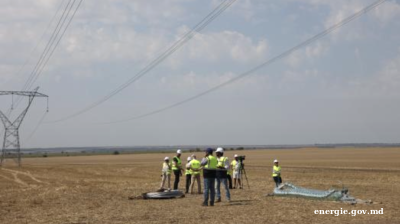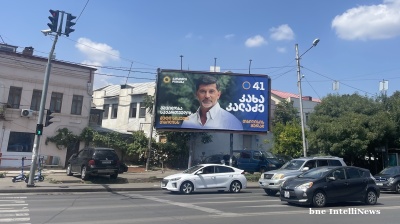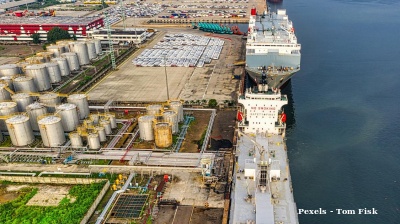The parties expected to enter Bulgaria’s parliament after the snap general election on October 2 fall into two broad camps: pro-Russian and pro-Western, neither of which is expected to secure a stable majority.
This represents a fundamental shift in alignment since Russia’s invasion of Ukraine. Previously in Bulgaria, the reformist Change Continues and Democratic Bulgaria had worked with the Bulgarian Socialist Party (BSP) and President Rumen Radev in an attempt to root out corruption and tackle the graft that had flourished during ten years of government by Boyko Borissov’s populist Gerb Party.
That alliance has now broken down, with East-West orientation becoming the biggest dividing line in Bulgarian politics.
At least six and possibly as many as nine parties are expected to pass the threshold to enter Parliament, leaving it as fragmented as ever. Despite the pressing economic issues facing Bulgaria and the need for a clear strategy in areas such as energy security, Bulgaria is likely to face yet more political uncertainty post-election.
Pro-Western reformers … and some unlikely allies
The pro-Western reformist group comprises of two former coalition partners, Change Continues and Democratic Bulgaria. Although there were wide expectations that the two formations, which have similar priorities, would join forces for the October 2 vote, Change Continues decided to go it alone. However, the party said that in the next parliament it will certainly work in coalition with Democratic Bulgaria.
What the two formations have in common is their strong pro-Ukrainian and pro-Western orientation, while they are also firmly against the Russian influence in the country. The last government led by Change Continues’ Kiril Petkov expelled 70 Russian diplomats in June. The move was backed by Democratic Bulgaria, but strongly opposed by their third coalition partner, the pro-Russian Bulgarian Socialist Party (BSP).
The former government also worked hard to take Bulgaria out of Russia’s orbit and cut its energy dependence from Moscow. Even before Gazprom’s decision to stop the delivery of natural gas to Bulgaria at the end of April, Change Continues’ co-founder Assen Vassilev repeatedly said the country would not negotiate a new contract with the Russian company, after the current one expires at the end of the year.
Democratic Bulgaria has for years been pushing for reforms of the judiciary and accountability of the chief prosecutor. Change Continues supports that priority as well. The formation also has strong positions regarding green economy and green energy.
However, it was the pro-Western orientation and the strong anti-Russian position of the two parties that, according to analysts, cost Petkov his government.
The pro-Western group also theoretically includes the former ruling Gerb Party and the Movement for Rights and Freedoms (DPS). However, this is questionable. Borissov has been accused of working for Russian interests in the energy sector, while DPS chairman of honour Ahmed Dogan has for years been associated with the Russia-owned oil refinery Lukoil Neftochim.
The lack of potential for cooperation between Change Continues and Gerb – the two parties leading the polls – was evident from a row that broke out in one of the last pre-election debates, when Petkov appeared instead of another member of Change Continues. Gerb representatives then walked out of the debate, saying that Petkov had broken the rules, as the debate was supposed to be among experts, not party leaders. Critics of Gerb interpreted the decision to walk out as cowardice.
The pro-Russian camp
Of the 28 political parties and coalitions that will race on October 2, more than half are defending or actively promoting the Kremlin’s positions, according to a recent analysis by Radio Free Europe. The list includes the BSP and several other formations that have a chance to enter the parliament, including far-right Vazrazhdane and pro-Russian Bulgarian Ascend. Ascend was founded by former defence minister Stefan Yanev after he was sacked by Petkov for refusing to call the Russian invasion in Ukraine a war.
In the run-up to the vote there have been suggestions that the large number of pro-Russian formations racing in the election could be a result of Kremlin activity in Bulgaria. Questions have also been raised about potential Russian financing – presumably aimed at giving the impression that Bulgaria remains rather pro-Russian than pro-Western in its orientation.
President’s (un)fair play
Another politician seen as being a member of the pro-Russian camp is Radev. According to interim report by OSCE mission to Bulgaria, Radev and the caretaker government he appointed are “visible in the pre-election environment with critical statements towards previous government’s decisions”.
Radev was seen as the godfather of the previous ruling coalition and of Change Continues. The party’s leaders became popular thanks to their work in a previous caretaker government appointed by Radev after the April 2021 general election. Furthermore, Change Continues openly supported Radev’s candidacy for a second term.
However, the Russian invasion of Ukraine put the president and the reformist government on the two sides of the new dividing line, with Radev becoming increasingly pro-Russian, although claiming he is for peace and against the war, while Petkov’s government took a strong pro-Western position. The rift between the president and the government was also seen as a possible cause for the fall of Petkov’s government.
Analysts suggest that Radev is interested in ruling as long as possible through interim governments and has no interest in achieving a stable ruling coalition in the country. Moreover, the current caretaker government under Gulub Donev’s government seems rather pro-Russian and has done everything it can to force talks with Gazprom on new deliveries of natural gas.
Even more fragmentation
Pre-election polls indicate Gerb, which lost significant support in the previous three elections, all held in 2021, would win between 23% and 29% of the vote, followed by Change Continues with between 16.3% and 19.2%. However, neither of the two main rivals could gain a comfortable majority to form a government, and Change Continues refuses to work with Gerb.
Both the frontrunners fall broadly into the pro-Western camp, perhaps not surprising given that Bulgarians, traditionally friendly towards Moscow, have become increasingly disapproving of Putin and his war. Approval of Russia and Putin has sunk from more than 60% to less than 30%.
The race for the third place seems tighter, with the BSP and the DPS expected to get very close results – around 12% for the DPS and around 10% for the BSP. Democratic Bulgaria will get between 5.7% and 8.1%, according to polls.
Two other parties have potential to pass the 3% threshold: Bulgarian Ascend and showman Slavi Trifonov’s vehicle There Are Such People (ITN). Trifonov’s party was a member of the ruling coalition with Change Continues, the BSP and Democratic Bulgaria, but pulled out in June, bringing down the reformist government. The formation has lost most of its support in the last few months.
Bulgarian Ascend’s ability to enter the parliament is highly uncertain and depends on the turnout. According to Market Links, Rise.bg and Vazrazhdane also have a chance of making it into the parliament.
Challenging talks ahead
The political parties are facing challenging talks and would have to make significant compromises if they want to form a government. However, they have already drawn many red lines that would need to be crossed if post-election talks are to be succesful.
Gerb is willing to unite with anyone to get one more chance to rule. Its leader, three-times prime minister Boyko Borissov, has proposed changes that seem designed to win over Change Continues, Democratic Bulgaria and the nationalist parties. On the other hand, it can always rely on the traditional, though informal, support of the DPS.
However, Change Continues and Democratic Bulgaria have repeatedly said they cannot work together with Gerb or the DPS, as the two formations were involved in several major corruption scandals.
On the other hand, Democratic Bulgaria and the BSP also have a red line: their positions on the war in Ukraine. Vladislav Panev of Democratic Bulgaria said on September 28 that a government would be possible if the two formations find a common ground regarding the war. Kornelia Ninova, the leader of the BSP, described the war as the dividing line.
In its pre-election report, the OSCE Office for Democratic Institutions and Human Rights (ODIHR) commented that the campaign tone has been often divisive, further politicising the issues of energy prices and with occasional accusations of corruption.
As the next parliament will be even more challenging than the last one, the chance of new early vote is significant. One option would be for political parties to take into account voters’ fatigue after four general elections in less than two years, and form a programme cabinet with certain tasks and a one-year horizon. Next autumn, Bulgaria is due to hold local elections and, if the political parties find a compromise, a snap general election could be held at the same time.
If a government is formed, it will have to deal with the difficult energy situation during the winter. Surging consumer and fuel prices are also making the situation complicated. Sofia will also have to urgently secure air policing for its sky as its fighter jets will have to be grounded soon.
‘Get out and vote!’
According to polls, after repeated elections more than 60% of Bulgarians would prefer any regular government to a new snap election, and analysts expect that the politicians will try very hard to find a solution.
Activists are calling on people to vote to define the country’s future. “Just go out and vote” is the most common appeal by reformist politicians and supporters in the past weeks in hopes for higher turnout and more clear representation of political forces.
In one metaphor for how the state of the country is seen, a photo of a just renovated street in front of parliament, already in a terrible condition just a week after repair works were completed, has been circulating. The photo is intended to illustrate the importance of voting for reformist parties.
“A simple illustration of everything that can be said. There is an election on Sunday and it is up to us how our road will look on Monday,” Nadezhda Tsekulova, prominent human rights and healthcare activist, wrote on Facebook, alongside a photo of the street.
Geopolitics may be dominating the election campaign, but for most Bulgarians the more important things are warm homes, affordable food and functioning infrastructure.
Features

World GDP forecasts raised, but US slowdown anticipated - Fitch
Global growth is now forecast to be 2.4% in 2025, up 0.2pp since June but a sizeable slowdown from 2.9% last year and below trend.

Moldova’s dramatic energy sector transformation
Chisinau ended decades of dependence on Russia in just four years — but will the upcoming general election derail the remaining reforms?

Local elections loom in Georgia
Georgia’s October 4 municipal elections are already mired in controversy amid a partial opposition boycott and mounting state repression, as major international observers refuse to participate.

Iran's nuclear materials 'Under rubble of attacks', Foreign Minister claims
Iran's Araghchi says that the only nuclear site currently accessible is the Russian-controlled Bushehr nuclear power plant in his meeting with the IAEA.




